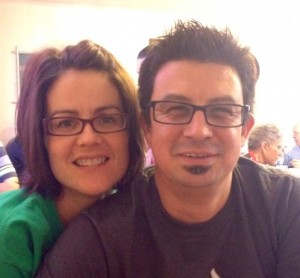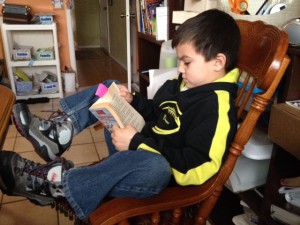From ancient writings there emerged four Greek words to describe four unique emotions that we label “love”. Simply put, these four emotions are affection, friendship, romance, and unconditional charity.
With Valentine’s Day, I think it’s fair to say that we’ve each considered “love” at least a bit this week. You’ve probably thought about relationships in your life for which you are grateful. Whether these are “romantic” in nature or not, you’ve likely measured how these relationships have grown and developed and how they can be nurtured for further growth and increased strength.
In each of your relationships, I’m sure you’ve come to realize that “love” is a give-and-take exchange. When a relationship is one-sided and a person feels they’ve given far more than they’ve received, bitterness and resentment enter and the relationship often deteriorates. To assure that the needs of both in a “loving” relationship are met, Loving Well Really Does Matter.
 Can get close enough to my Valentine!
Can get close enough to my Valentine!
My husband Franklin’s love language is Words of Affirmation. In our marriage, my words can make or break his mood. Not only do compliments and encouraging, kind, and humble words mean the world to him, but the absence of words of affirmation speaks volumes.
Our oldest son Bailey’s love language is Quality Time. He loves focused attention and quality conversation. Hanging out with friends and family are extremely important to Bailey. Unlike me as a teenager, Bailey doesn’t want to miss a good meal or movie time with us if we’ve got some down time.
It doesn’t matter what the trinket might be, our daughter Emma (whose love language is Gifts) will love it. She holds onto “treasures” as memories of people, events, and places that are significant. Her OomPapa’s tee shirts, pillows made out of her Papa’s favorite flannels, letters she has received, and clothes her friends and cousins have given her all exemplify “love”.
Caden and I are the only two in our family who share the same love language. We interpret “love” through Physical Touch. At 8, Caden wants to sit on someone’s lap while watching TV, hold hands while walking anywhere, and have his hair or back rubbed while falling asleep.
Do you know your children’s love languages? If not, Gary Chapman’s The Five Love Languages is a good place to start.
Words of Affirmation and Gifts don’t come naturally for me. They take more intentional thought and effort on my part. I don’t need either nearly as much as I need physical touch and quality time, but in meeting Franklin and Emma’s needs, it’s not about filling my tank but theirs’.
I think we often take Luke 6:38 out of context and somehow connect it to tangible blessings; “Give, and it will be given to you. A good measure, pressed down, shaken together and running over, will be poured into your lap,” but the final part of the passage, “For with the measure you use, it will be measured to you,” brings us to love and compassion. When we intentionally (and sacrificially) love our family, speaking into their lives to bless them to their very core (their love language), and walk in confidence that the love we pour into their lives will be returned, how much happier our homes will be and how much more our children will look to us as shepherds in their lives.
How do your children (and your spouse) hear “I love you”? Have you ever specifically said “I love you” in a powerful way that will never be forgotten? Share your examples of Loving Well by joining the conversation, replying at the top of this post.
Before you leave the site, follow my blog (top, right of this post). It’s quick and easy
For more from Marea, check out Me and Thee Studios’ faith based leveled readers for 1st-2nd graders at http://www.meandtheestudios.com/early-reader-collection.html.

